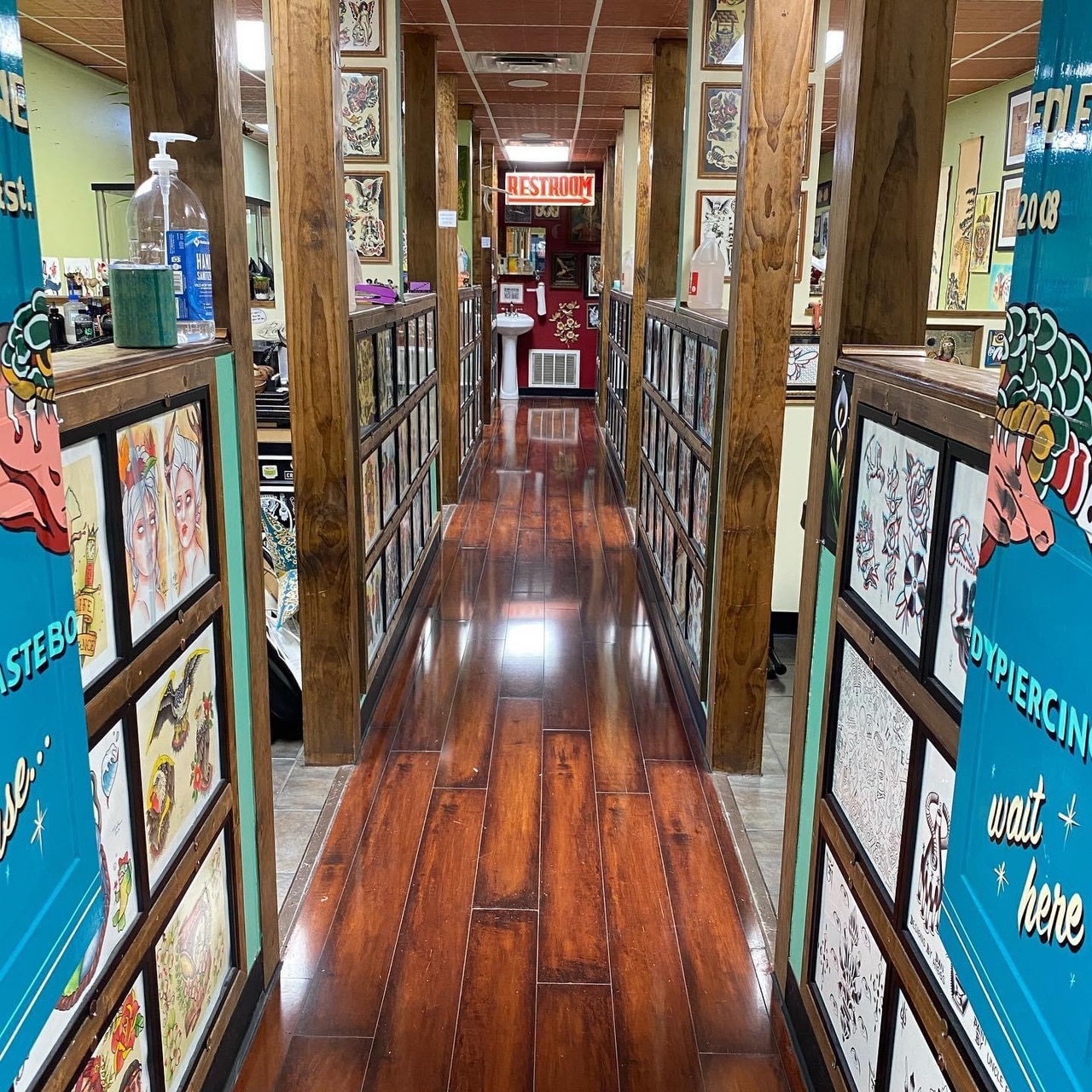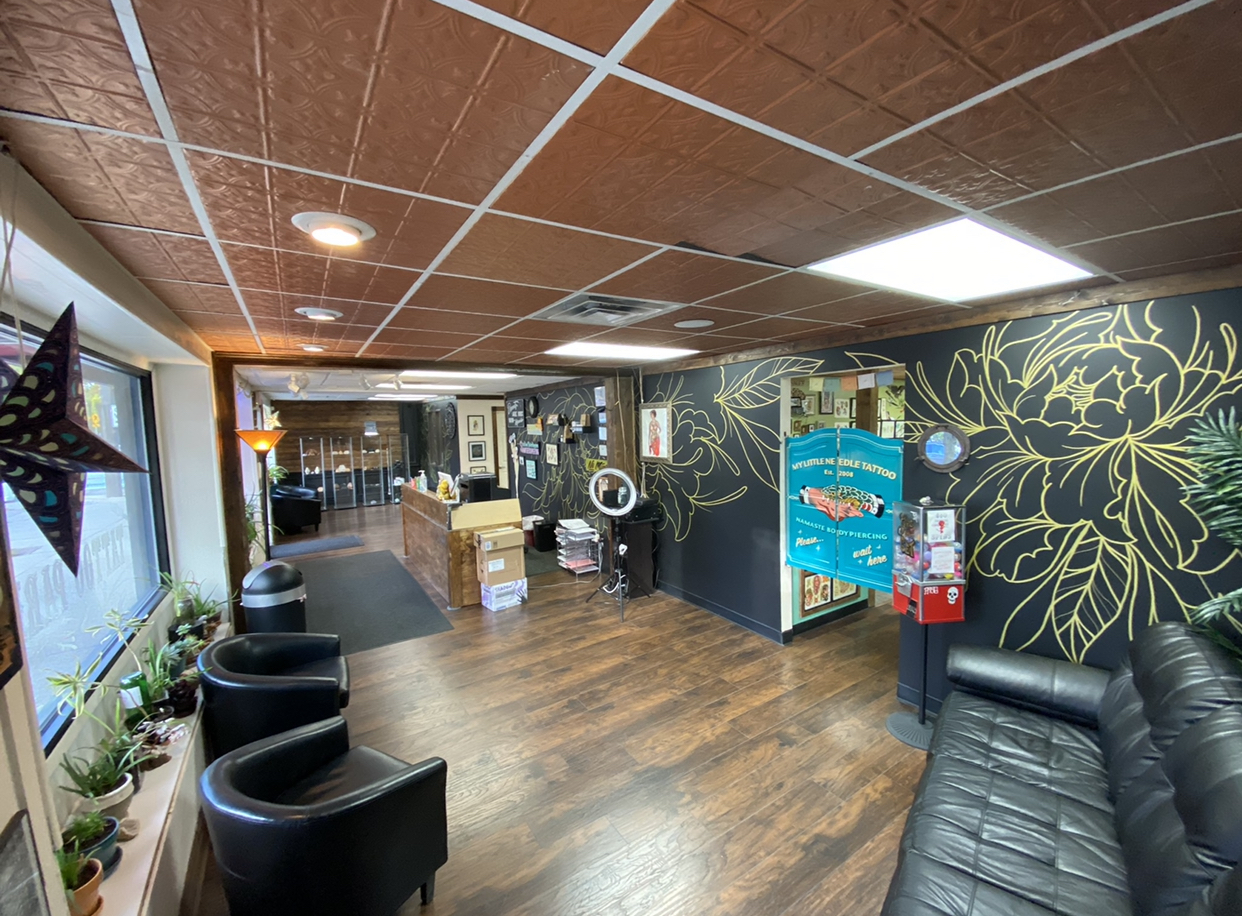My Little Needle Tattoo Artists Affirm Every Client at This Queer-Run Plymouth Shop
A shop that is moving the needle, in more ways than one

At My Little Needle Tattoos in Plymouth, the staff invites clients in with open arms. The mostly queer team shares a mission to make the vulnerable experience of getting a tattoo more comfortable and welcoming for the LGBTQ+ community.
The studio’s owner, Latricia (Trish) Horstman, began tattooing in 2002 and opened My Little Needle shortly after in 2008. Ever since, she says, she has been “living her dream every day.”
“I always say that this place is like me in building form. I always wanted it to be a zen zone… I always want people to feel embraced here, walk in and feel comfortable, like they’re taken care of,” she says. “More than half my staff is queer, we have a couple of artists who are trans, and it’s really important to me that they know this is a place that supports them wholeheartedly, no matter what.”
While the makeup of staff at the shop has continued to evolve, the current crew is like a family, they all say. Everyone sticks up for and supports one another. In the shop, there is a no-tolerance policy for misgendering, deadnaming or bigotry of any kind. This familial culture among the staff helps create a climate where customers feel seen and respected as part of the family too.
“This definitely feels like one of the safest environments I’ve ever worked in, which is pretty amazing,” says Natasha Pehrson, the shop’s studio manager. “Being a queer person and someone who’s nonbinary, just something as simple as my coworkers using my correct pronouns is really huge.”
Horstman’s relationship with her team is mutually beneficial, as she often learns from her staff just like they learn from her. “I absolutely adore my crew here. They are really wonderful humans,” she says. “Basically everybody here loves each other. Everyone has mutual respect, we talk about our art, we criticize each other in a constructive, healthy way.”
Their close bond helped Horstman get through her pregnancy last December when she had her twin babies two months early. “It was a really traumatic birth, I actually almost passed away during it,” she says. “These guys kept this place afloat and checked in on me on the regular, and it was really good to know that I built the studio up and had the right people in place where I could not physically be in the building, and this place ran like a charm.”
Having a place to be themselves is something that all of Horstman’s staff are grateful for.

“Personally, it feels like how a family should feel,” says Tyler Nguyen, a tattoo artist that has been at the shop the longest. “It’s nice to have a space where you can be yourself, be a person and exist in that environment without having to worry about someone trying to knock your head.”
One of the shop’s tattoo artists, Oberon Rattus, came out as transgender during his time working at My Little Needle and says he has received nothing but support.
“I didn’t lose my job, I didn’t get beat up by my coworkers,” Rattus says. “I just got my name legally changed this year and it hasn’t ever been an issue. When I had to ask for accommodations with my paychecks and when I needed time off for my top surgery and for my hysterectomy, Trish was incredibly supportive and very, very cool about that.”
Specifically, Horstman helps support her employees by providing queer-supportive benefits. “I want to make sure that when [Oberon] is off work, his time is paid for, so we have insurance that makes sure that he gets paid time off for his healing,” she says.
Rattus’ personal, lived experience as a transgender man has positively impacted clients’ experience at the shop. When he started at My Little Needle in 2019, Rattus noticed that the paperwork customers fill out didn’t have a spot for pronouns and a preferred name, which he knew his queer customers would need. So, he says he “timidly” asked Horstman to add it; she was quick to do so and the form has been updated ever since.
“This was my second or third week working here… and she was so cool about it,” Rattus says. “She was like, ‘Oh my god. Let’s go change that right now.’”
Every employee agreed that Horstman is always open to feedback and listens to people’s ideas.
“The thing that makes all this work is Trish, I’ll be honest,” Nguyen says. “It sounds biased because she taught me, but I travel a lot, I do guest spots, and I’ve never met a shop owner that just listens to somebody and is like ‘Yeah, you know what, we’ll try that and if it doesn’t work, then it doesn’t work,’ She’s done that for everything that I’ve ever brought up.”
Horstman’s intense desire to pour love into the shop’s clients is a constant priority — and that intensity is contagious.
“It’s only fair to extend that same feeling and respect to my clients because it’s what my boss puts out and so that’s what I wanna fucking put out too,” Rattus says. “Trish specifically as a human being has been so receptive to what is good for all of our clients, certain types of accommodations, certain types of language that we use around here, making sure our staff is aware and trauma-informed.”

As part of Still Not Asking For It, an annual nationwide tattooing fundraiser with the mission to raise awareness about sexual violence, staff at My Little Needle take yearly classes focused on trauma-informed communication.
For the event, shops submit an application to be qualified as a “safe space.” Then, each artist creates small flash pieces for $100 each and work hard during a long day of tattooing. All of the money made during the event goes to a charity of the shop’s choosing.
This year, My Little Needle Tattoos was able to raise $14,000 to donate to Avalon Healing Center, a Detroit nonprofit working to empower people affected by sexual violence.
Unfortunately, people in the tattoo industry are still experiencing sexual violence and sexism. While tattooing originated thousands of years ago in various cultures outside of America, in the United States, the industry is mostly made up of older straight white men.
“We have a very young history in America with tattooing where we can actually almost build a family tree,” Horstman says. “However, it’s been predominantly white men, so because of that, being a woman, or being queer in this industry, you’re a minority.”
Horstman ssaid that there have been times when a male-presenting tattoo artist has been at the front of the store with her and customers will speak to him before her, thinking he’s the owner. When he corrects them, their tone often changes when they realize they have to speak with a woman. And that’s not the only form of sexism she has faced in the industry. “I’ll sit in a room with other male tattooers at times, and they’ll all talk about each other’s work, and see each other on the same level,” she tells Pride Source. “But when it comes to talking to me, I deal with sexual advances or get talked down to. When I was first coming up, they didn’t talk about the idea of being a queer-friendly place and there were a lot of awful jokes that would go around. That doesn’t happen here; we defend each other and we stick by each other.”
These experiences, along with being a pansexual woman herself, are all part of the reason why Horstman wants her shop to be a safe place for everyone. This is not only true when it comes to people being comfortable living authentically, but also when it comes to people’s bodies, as she takes pride in using safe ink and tattoo supplies.
In 2019, Horstman got involved in Michigan’s board for rewriting tattoo laws and has helped a lot in the process of creating new tattooing guidelines for the state.
“We are kind of trying to bring it up to date where we know for sure that artists are protected and clients are protected, as far as cleanliness, as far as the quality of the materials that are put into and used on our bodies and artist safety,” she says.“To me, just equally important as making a safe space is having quality ink going into the skin, quality products used here, so I sell everything to my artists to make sure they have top-notch supplies.”
Moving forward, My Little Needle Tattoos wants to continue to be a safe place for clients and hopes that all tattoo shops can do the same.
“Acceptance is definitely not one of those things that just happens passively, so I’m hoping that more people stick out and stand up for those who need to be stood up for,” Nguyen says.
Fellow artist Rattus agrees: “I hope that this shop and tattooing in general just continues to become more positive and friendly and accepting.”
Horstman has recently accomplished a goal to help make sure that at least her shop can stay forever, purchasing the building that My Little Needle Tattoos resides in. “I wanted a solid space that no matter what, like, let’s say, I got hit by a bus tomorrow, my artists have a place to go and work,” she says. “No matter what, without me or with me, this place is going on. My Little Needle lives on.”









